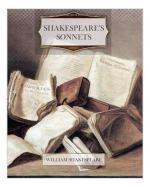Unthrifty loveliness, why dost thou spend
Upon thy self thy beauty’s legacy?
Nature’s bequest gives nothing, but doth lend,
And being frank she lends to those are free:
Then, beauteous niggard, why dost thou abuse
The bounteous largess given thee to give?
Profitless usurer, why dost thou use
So great a sum of sums, yet canst not live?
For having traffic with thy self alone,
Thou of thy self thy sweet self dost deceive:
Then how when nature calls thee to be gone,
What acceptable audit canst thou leave?
Thy unused beauty must be tombed with
thee,
Which, used, lives th’ executor
to be.
V
Those hours, that with gentle work did frame
The lovely gaze where every eye doth dwell,
Will play the tyrants to the very same
And that unfair which fairly doth excel;
For never-resting time leads summer on
To hideous winter, and confounds him there;
Sap checked with frost, and lusty leaves quite gone,
Beauty o’er-snowed and bareness every where:
Then were not summer’s distillation left,
A liquid prisoner pent in walls of glass,
Beauty’s effect with beauty were bereft,
Nor it, nor no remembrance what it was:
But flowers distill’d, though they
with winter meet,
Leese but their show; their substance
still lives sweet.
VI
Then let not winter’s ragged hand deface,
In thee thy summer, ere thou be distill’d:
Make sweet some vial; treasure thou some place
With beauty’s treasure ere it be self-kill’d.
That use is not forbidden usury,
Which happies those that pay the willing loan;
That’s for thy self to breed another thee,
Or ten times happier, be it ten for one;
Ten times thy self were happier than thou art,
If ten of thine ten times refigur’d thee:
Then what could death do if thou shouldst depart,
Leaving thee living in posterity?
Be not self-will’d, for thou art
much too fair
To be death’s conquest and make
worms thine heir.
VII
Lo! in the orient when the gracious light
Lifts up his burning head, each under eye
Doth homage to his new-appearing sight,
Serving with looks his sacred majesty;
And having climb’d the steep-up heavenly hill,
Resembling strong youth in his middle age,
Yet mortal looks adore his beauty still,
Attending on his golden pilgrimage:
But when from highmost pitch, with weary car,
Like feeble age, he reeleth from the day,
The eyes, ’fore duteous, now converted are
From his low tract, and look another way:
So thou, thyself outgoing in thy noon:
Unlook’d, on diest unless thou get
a son.




